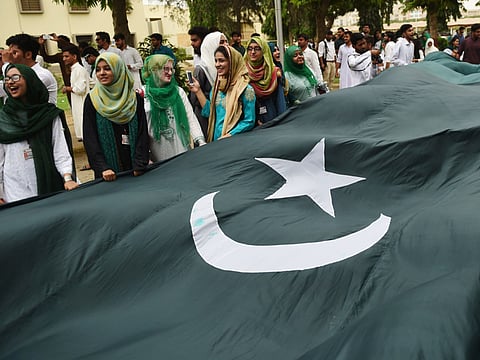Pakistan’s resilience has proved to be its strength
The country’s myriad problems notwithstanding, it needs to cash in on its youth dividend and make education a top priority

Pakistan’s 71st independence anniversary is a time to look back in order to visualise the future. The country is a prime example of the historian Arnold Toynbee’s theory of challenge and response. If the challenge facing a civilisation is too great, then the struggle to survive leaves no room to develop. Conversely if there is hardly any challenge, there is no spur to change. Progress comes out of the crucible of facing and overcoming the challenges.
The very formation of Pakistan was a tremendous achievement. The Muslim community in the subcontinent had to overcome the opposition of the ruling British colonial power and the larger non-Muslim community. Once independent, it had to make do with skeletal civil services, seven million traumatised refugees, no industrial base, a small ill-equipped military, and hostile neighbours on both sides with irredentist claims. Many foreign observers and neighbours assessed that the security and economic challenges were so huge that the new country would not survive. But Pakistan survived and prospered. Labelling the country as being at the edge of chaos (and a failing state) has been periodically revived by many forces. Reality is much different. Yes challenges persist: internal as well as external. The record of successive governments and their leadership, both political and military, has been mixed
As Pakistan’s industrial base was being built up, infrastructure augmented, its democratic consciousness deepened. The country’s workers contributed to the process of nation-building as technical expertise got better, while remittances of overseas Pakistanis bolstered the home economy; and a growing middle class.
Despite the country being dismembered in 1971, Pakistan rebounded, enhanced its regional and international relevance, and was looked up to in the Muslim world as the champion of its causes and a strong military power. The tragic events of 1971 imbued policymakers with a never again-dedication. Though unfairly targeted in 1974, Pakistan overcame all sanctions and restraints to become a nuclear power utilising a technological path unmatched by any nuclear power for its first test. A nuclear capability not only pivotal to peace and security in South Asia but whose peaceful uses are contributing to electricity generation in this fossil-fuel deficit country and providing no-cost nuclear diagnosis and treatment annually to 800,000 cancer patients.
On the geopolitical front, the American-sponsored jihad to remove Soviet troops from Afghanistan depended upon Pakistan’s support but left a legacy of extremism, narcotics trade, and arms smuggling; apart from nine million refugees from Afghanistan of whom 1.4 million remain after almost four decades, and at least an equal number of illegal economic migrants.
Economic woes
As Pakistan recovered from the first Afghan ordeal, the tragic terrorist attack of September 11 took place. With Western occupation, the second blowback from Afghanistan began, worsened by the use of Afghan soil by some countries to sponsor insurrectionists in Pakistan with the resultant loss of so many civilian and military lives. It is facile for others to say that Pakistan should ‘do more’ to help resolve Afghanistan or develop a better counter-extremism narrative. Credit goes to the discipline of the Pakistan military that despite the unpopularity of the government’s support for the occupying forces in Afghanistan — who still survive on the oxygen that Pakistan provides — the long and hard campaign against terrorists within Pakistan has been largely won. Many of the current economic difficulties of Pakistan are due in large part due to the economic costs resulting from the continuing occupation of and turmoil in Afghanistan.
What is more, natural disasters too have not spared Pakistan. The October 2005 earthquake killed 67,000 people within a few hours, the floods of 2010 and 2011 inundated large and heavily populated parts of the country, but the nation rebounded. However the resilience of Pakistanis stands out.
What though of the future? It is a time of hope, with significant political change. Imran Khan, the next Prime Minister carries none of the traditional baggage of Pakistani politicians (civil and military) of these past 60 years. He has no dynasty, businesses, or riches to protect. Khan has a majority mandate and unlike his predecessors is capable of being decisive.
The solution to the country’s problems are self-explanatory. While population growth needs to be further reduced and education made a priority, there is a youth dividend, which is increasingly politically active. The China Pakistan Economic Corridor, through its multidimensional projects, should continue to contribute towards the transformation of Pakistan. On this independence anniversary it is clear that the country has a bright future. Though Pakistan’s development has been uneven, the momentum of its 214 million inhabitants, whose indomitable spirit has overcome so many challenges, shall always carry it forward.
Tariq Osman Hyder, a retired ambassador, is a Distinguished Visiting Fellow at Pakistan’s National Defence University.



